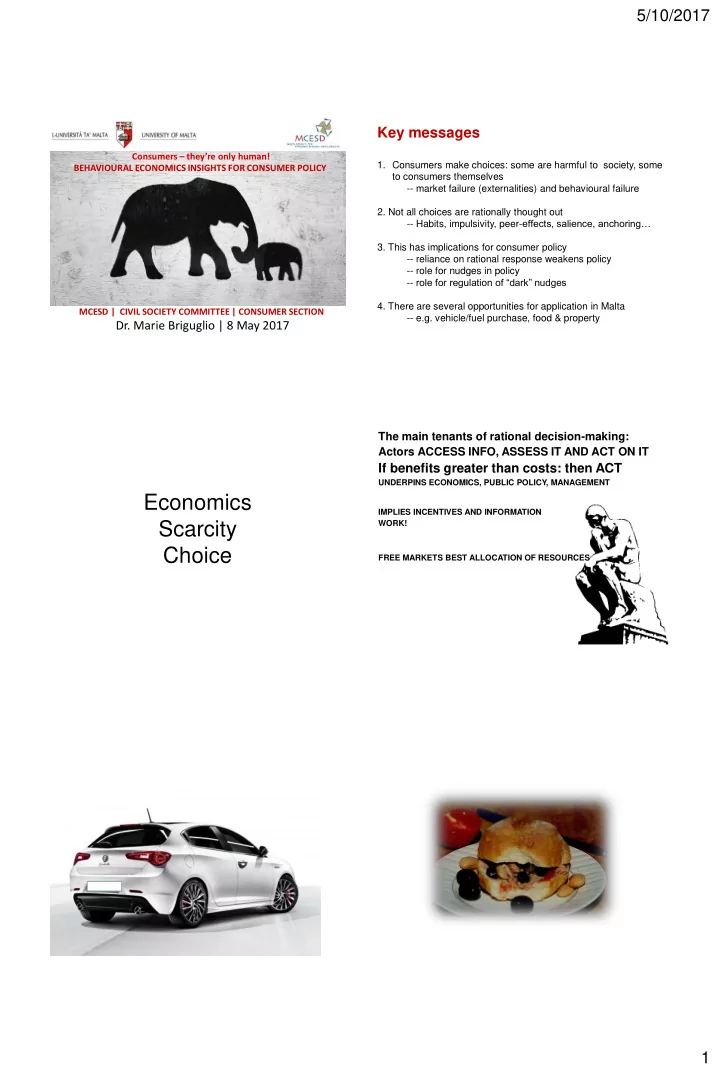

5/10/2017 Key messages Consumers – they’re only human! 1. Consumers make choices: some are harmful to society, some BEHAVIOURAL ECONOMICS INSIGHTS FOR CONSUMER POLICY to consumers themselves -- market failure (externalities) and behavioural failure 2. Not all choices are rationally thought out -- Habits, impulsivity, peer- effects, salience, anchoring… 3. This has implications for consumer policy -- reliance on rational response weakens policy -- role for nudges in policy -- role for regulation of “dark” nudges 4. There are several opportunities for application in Malta MCESD | CIVIL SOCIETY COMMITTEE | CONSUMER SECTION -- e.g. vehicle/fuel purchase, food & property Dr. Marie Briguglio | 8 May 2017 The main tenants of rational decision-making: Actors ACCESS INFO, ASSESS IT AND ACT ON IT If benefits greater than costs: then ACT UNDERPINS ECONOMICS, PUBLIC POLICY, MANAGEMENT Economics IMPLIES INCENTIVES AND INFORMATION Scarcity WORK! Choice FREE MARKETS BEST ALLOCATION OF RESOURCES 1
5/10/2017 Information Education Pricing (PPP) POLICY IMPLICATIONS OF MARKET Regulation FAILURE? Infrastructure To fix MARKET failure and bring economy back on track Sustainable Lifestyles Project CANA TALKS ABOUT MAKING DECISIONS The rational way… Human beings are “cognitive misers” Comparing costs and benefits, now and in future, for us and others we care about. Fiske and Taylor 1984 The less rational way… Automatically, intuitively, and often correct… TEST Humans use certain rules of 24 X 18= thumb, mental shortcuts, or simply rely on inherent behavioural biases to make decisions Kahneman and Tversky 1974 2
5/10/2017 BEHAVIOURAL HEURISTICS We fall into habits We stick with the status quo We are short-sighted What if we consider that consumers are actually human? We fear losses more than we love gains Re-thinking how people actually make decisions, We follow the herd suggests re-thinking We are mostly influenced by what we see ... how to design interventions We are easily primed into decisions Especially when… Decisions are Infrequent (car, property) Delayed effect, poor feedback (food) Wrong time (after work?) distracted, angry.. NUDGES Attention to information and incentives but also… Can we teach PUBLIC policy a few behavioural tricks? Who delivers policy message? Front runners: USA, UK, EU What is the perceived norm? Can we make good behaviour the DEFAULT? Can we introduce commitment devises? Can we regulate predatory behavioural Can we SIMPLIFY the right choice? tricks? Can we check for predatory priming? Can we control dark nudges like present benefits? DEFAULT CHOICES IN ORGAN DONATION Johnson and Goldstein 2003 Pichert & Katsikopoulos (2008) DEFAULT IN ELECTRICY CONSUMPTION 3
5/10/2017 Part 3 e.g. make it salience, make it easy in FOOD SALIENCE: In contrast to McDonald’s old policy of asking whether you want to super-size your order, these 3 field experiments asked customers in a Chinese restaurant if they wanted to down-size their portions of side dishes. The 14-33% of customers who did so did not compensate by ordering more in other areas and ate 200 less calories on average. SALIENCE & EASE: Hanks et al. looked at encouraging healthier eating in school lunchrooms through strategic placement of certain foods. In the healthier line, sales of healthier food increased by 18% and grams of less healthy food consumed decreased by 28%. The BIT tested whether using social proof could increase charitable giving among employees. The control group received an e-card from an existing donor simply explaining why that person donates and asking to join them. The treatment group received the same card but with an attached picture of the existing donor. Picture increased the number of new donors CONSIDER UNINTENDED CONSEQUENCES E.g. from Botti et al 2006: 800,000 eligible employees at 657 companies, 401(k) plans ranged from 2 to 60 investment options, As choices increased what happened to the likelihood of investing? PASSENGER VEHICLES, FUEL, REPAIRS Market Failure? Traffic Congestion FOOD & DRINK Air Pollution Accidents Policy Implications? Policy Implications? Market Failure? Food Waste Polluter pays (e.g. per mile, per emission) Polluter pays Behavioural Failure? Resource depletion Overspending on vehicle repair, Change the default (e.g. infrastructure), Labelling Herding, default option Make it less automatic (e.g. loan cooling off), Default options Behavioural Failure? Low salience of walking benefits Low nutrition food, obesity Control dark nudges Availability Drink driving Smoking Teach decision making skills (de-biasing) Teach decision making skills Alcohol Low spend on education Control dark nudges 4
5/10/2017 Resources E.g. of practical consumer education Hastings G. Social Marketing: Why should the devil have all the best Tunes? (2007) Elsevier, Oxford * CRITICAL THINKING/MINDFULNESS vs PEER PRESSURE, MEDIA INFLUENCE e.g. STOP TO THINK. Thaler and Sunstein “Nudge: Improving Decisions about Health, Wealth, and Happiness”. (2008) Yale * PROMOTION OF UNDERCONSUMED GOODS/SERVICES University Press Exercise, art, social interaction, volunteering, learning Briguglio M. 2016 “Humans Behave!” in Outreach On * DECISION MAKING GRID Climate Change and Sustainable Development, Edition COP 21 Paris, 5. Business Investment and Innovation, Available: http://outreach.stakeholderforum.org/index.php/previous -editions/cop-21-paris/edition-5-business-investment- and-innovation/11950-humans-behave Tutor Marie Briguglio Lecturer in behavioural Economics, Research Methods, Social Marketing, Environmental Economics (University of Malta). | PhD Economics (Stirling); MSc Environmental and Resource Economics (UCL), BA Honours Economics (Malta). | On-going research on circular economy (by Horizon 2020), environmental indicators (Environment and Resources Authority), cultural participation (Malta Arts Council, European Capital of Culture). | Previously Deputy Director at the Malta Environment and Planning Authority (Environment) and National Focal point to the United Nations Framework Convention on Climate Change. | Award winning television writer/producer. | Active in behavioural change campaigns, outreach, co-Chairperson of the Forum for Active Community Engagement within the President of Malta's Foundation for the Wellbeing of Society. | Representation on several boards. | Main areas of expertise: Behavioural Economics, Environmental Economics, Market Failure, Communication, Social Marketing. marie.briguglio@um.edu.mt 5
Recommend
More recommend